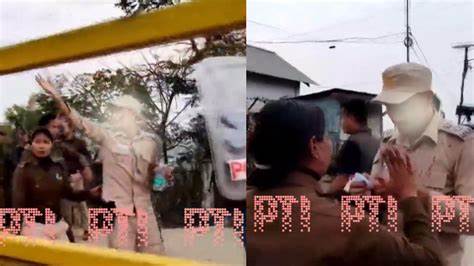The democratic process in India is often hailed as a symbol of unity and strength, showcasing the nation’s commitment to fair and transparent elections. However, on occasions, the electoral landscape is marred by incidents of violence and disruption, reminding us of the challenges that accompany the electoral process. One such incident unfolded during the nomination scrutiny process in Longding, Arunachal Pradesh, casting a shadow over the sanctity of the electoral process and raising concerns about the prevalence of political violence in the region.
Located in the northeastern state of Arunachal Pradesh, Longding is no stranger to the specter of political unrest and ethnic tensions that have plagued the region for decades. As the state gears up for assembly elections, the nomination scrutiny process represents a crucial milestone in the electoral calendar, providing candidates with an opportunity to submit their credentials for review by the Election Commission and ensuring compliance with electoral laws.
However, the nomination scrutiny process in Longding took a tumultuous turn when a group of agitated individuals resorted to stone-pelting outside the venue where the scrutiny was being conducted. Reports indicate that the incident erupted following allegations of irregularities and bias in the scrutiny process, with supporters of certain political factions venting their frustration through acts of violence and intimidation.
The stone-pelting incident not only disrupted the nomination scrutiny process but also posed a grave threat to the safety and security of election officials, candidates, and bystanders present at the venue. Images and videos circulating on social media depicted scenes of chaos and pandemonium as stones rained down on the venue, prompting authorities to intervene and restore order.
The incident in Longding underscores the volatile nature of politics in Arunachal Pradesh, where simmering tensions and rivalries often boil over into acts of violence and confrontation. The region, characterized by its diverse ethnic landscape and complex socio-political dynamics, has been grappling with issues of insurgency, tribal conflicts, and political instability for decades, posing formidable challenges to the democratic process.
Furthermore, the stone-pelting incident serves as a stark reminder of the urgent need to address underlying grievances and foster a culture of peaceful coexistence and dialogue among various stakeholders in the region. The resort to violence as a means of expressing dissent or resolving disputes not only undermines the democratic fabric of society but also perpetuates a cycle of mistrust and animosity that hampers efforts towards reconciliation and progress.
In the aftermath of the incident, authorities in Arunachal Pradesh have launched an investigation to identify the perpetrators and ensure that those responsible for instigating violence are brought to justice. Additionally, measures have been put in place to bolster security arrangements and prevent a recurrence of such incidents during the electoral process.
Moreover, the Election Commission has issued stern warnings against any attempts to disrupt the electoral process through violent means, reaffirming its commitment to conducting free, fair, and peaceful elections in the state. The Commission has urged all political parties and stakeholders to adhere to the principles of democratic conduct and uphold the integrity of the electoral process.
As Arunachal Pradesh navigates the complexities of the electoral landscape, it is imperative for political leaders, civil society organizations, and grassroots activists to work collaboratively towards fostering a culture of tolerance, inclusivity, and respect for democratic values. The stone-pelting incident in Longding serves as a sobering reminder of the fragility of democracy and the need for concerted efforts to safeguard its principles in the face of adversity.
In addition, the stone-pelting incident during the nomination scrutiny process in Longding, Arunachal Pradesh, highlights the challenges and vulnerabilities inherent in the electoral process, particularly in regions marked by political volatility and ethnic tensions. It underscores the imperative for stakeholders to uphold the principles of democracy, engage in constructive dialogue, and eschew violence as a means of resolving differences. Only through collective action and unwavering commitment to democratic ideals can Arunachal Pradesh chart a path towards peace, progress, and prosperity.



